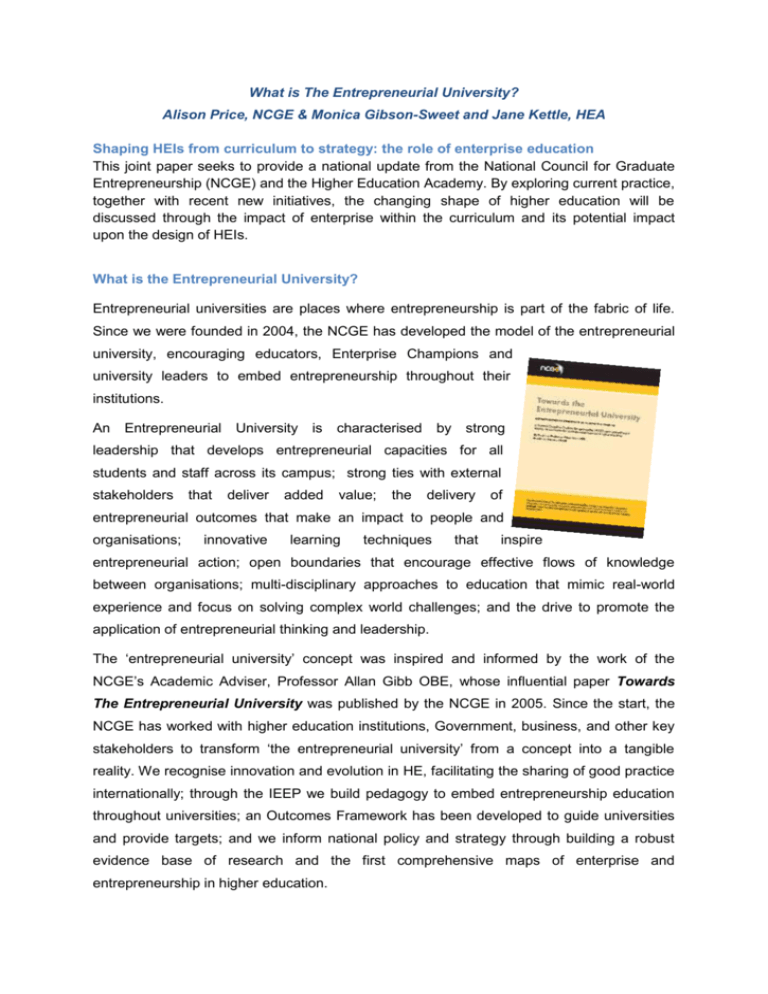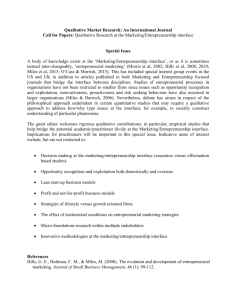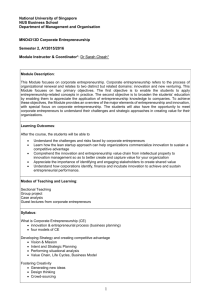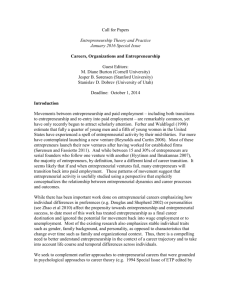Alison_Price_Paper - Higher Education Academy
advertisement

What is The Entrepreneurial University? Alison Price, NCGE & Monica Gibson-Sweet and Jane Kettle, HEA Shaping HEIs from curriculum to strategy: the role of enterprise education This joint paper seeks to provide a national update from the National Council for Graduate Entrepreneurship (NCGE) and the Higher Education Academy. By exploring current practice, together with recent new initiatives, the changing shape of higher education will be discussed through the impact of enterprise within the curriculum and its potential impact upon the design of HEIs. What is the Entrepreneurial University? Entrepreneurial universities are places where entrepreneurship is part of the fabric of life. Since we were founded in 2004, the NCGE has developed the model of the entrepreneurial university, encouraging educators, Enterprise Champions and university leaders to embed entrepreneurship throughout their institutions. An Entrepreneurial University is characterised by strong leadership that develops entrepreneurial capacities for all students and staff across its campus; strong ties with external stakeholders that deliver added value; the delivery of entrepreneurial outcomes that make an impact to people and organisations; innovative learning techniques that inspire entrepreneurial action; open boundaries that encourage effective flows of knowledge between organisations; multi-disciplinary approaches to education that mimic real-world experience and focus on solving complex world challenges; and the drive to promote the application of entrepreneurial thinking and leadership. The ‘entrepreneurial university’ concept was inspired and informed by the work of the NCGE’s Academic Adviser, Professor Allan Gibb OBE, whose influential paper Towards The Entrepreneurial University was published by the NCGE in 2005. Since the start, the NCGE has worked with higher education institutions, Government, business, and other key stakeholders to transform ‘the entrepreneurial university’ from a concept into a tangible reality. We recognise innovation and evolution in HE, facilitating the sharing of good practice internationally; through the IEEP we build pedagogy to embed entrepreneurship education throughout universities; an Outcomes Framework has been developed to guide universities and provide targets; and we inform national policy and strategy through building a robust evidence base of research and the first comprehensive maps of enterprise and entrepreneurship in higher education. The Institutional Environment “How an institution’s culture has been transformed to provide environments for supporting student enterprise and graduate entrepreneurship and how leadership for driving enterprise and entrepreneurship is demonstrated.” In Towards the Entrepreneurial University: Entrepreneurship Education as a lever for change (2005), Professor Allan Gibb OBE advocates the importance of institutional environments that support a widely based model of entrepreneurship focused on the development of entrepreneurial behaviours, attributes and skills. Organisations must utilise and stimulate these qualities. Such institutions recognise that the pursuit of entrepreneurial behaviours may be valuable in a range of contexts, not just in business. It is relevant both to the organisation and to the individual as worker, consumer and family or community member. Social entrepreneurs who can organise efforts to tackle challenges and boost social cohesion are net contributors to their communities. This aligns closely with the core values and aspirations of higher education – to develop the whole person and engender in them agency to succeed, and to prepare people willing and able to contribute to civil society and economic development. Universities with entrepreneurship among their main strategic objectives will reflect this in their leadership and governance, employing a leader at Pro Vice-Chancellor level responsible for enterprise and entrepreneurship. They will promote organisational change to build capacity and widen access to opportunities for entrepreneurship education and support, and sponsor innovative collaborations with business and other external stakeholders. Entrepreneurial Impact “How an institution’s efforts have affected the nature of entrepreneurial outcomes for staff, students and graduates; what step-changes have been achieved in the delivery of regional and national entrepreneurship goals; how the institution captured and demonstrated good practice and effectiveness; and ways in which the institution’s experiences influenced policy or practice elsewhere.” An ambitious, forward-thinking and inclusive institution will bring its staff and students along with it as it achieves success, inspire their involvement, and generate a collective ‘can-do’ attitude. Entrepreneurial universities carry themselves with confidence and engender trust in their partners. Their impacts can be felt through linkages throughout the regional economy and nationally and internationally in their fields of expertise. Performance will be planned, monitored and bench-marked against competitors, and staff and departmental targets and incentives will encourage the attainment of targets for enterprise activity. ‘Open boundaries’ are also a characteristic of entrepreneurial universities keen to share good practice with others through participation in initiatives such as the Academic Development Programme (IEEP) and the International Entrepreneurship Educators Conference (IEEC) Sept 2-4th 2009. The work of the NCGE The National Council for Graduate Entrepreneurship (NCGE) is the national focal point for entrepreneurship in higher education and collaborates with bodies across the UK and internationally. The NCGE aims to embed a culture of enterprise and entrepreneurship throughout all our universities. Now its work is progressing in exciting new directions. Building on its development of and support for entrepreneurship educators through the highly successful International Entrepreneurship Educators Programme (IEEP), run jointly with Enterprise Educators UK, the NCGE is pioneering The Entrepreneurial University Leadership Programme with Oxford University’s Saïd Business School. Most universities already embrace a range of entrepreneurial activities. The leadership challenge is that of strategically integrating them to provide a wider range of entrepreneurial opportunities for staff and students. This new Programme is designed for Vice-Chancellors, Pro ViceChancellors and other senior university leaders, and is focused upon the process of leading change to develop many aspects of ‘the entrepreneurial university’. This initiative also connects with a wider project led by the NCGE to realise a central tenet of the Government’s Enterprise Strategy white paper (2008) – the creation of University Enterprise Networks (UENs). The NCGE’s role is to set up and manage the UENs in order that they create the right conditions for better, more responsive collaboration between major business and industry sectors and universities and economic development agencies. The UENs will ensure more students and graduates acquire the skills for enterprise and entrepreneurship they need to achieve business growth, whether as employees or in starting and running their own businesses. FlyingStart is the part of NCGE activity that works directly with students, postgraduates and graduates (within five years of leaving university). Its activities are dedicated to getting student and graduate businesses started: supporting and developing graduate start-ups from ideas to implementation. Central to FlyingStart is www.FlyingStartOnline.com, a web-based community with 13,800 members which provides information and online mentoring, as well as networking opportunities, for all UK student, postgraduate and graduate entrepreneurs (within five years of leaving university). It carries news of the dedicated FlyingStart Programmes and Workshops that take place around the country. For more information about the NCGE, visit www.ncge.com








